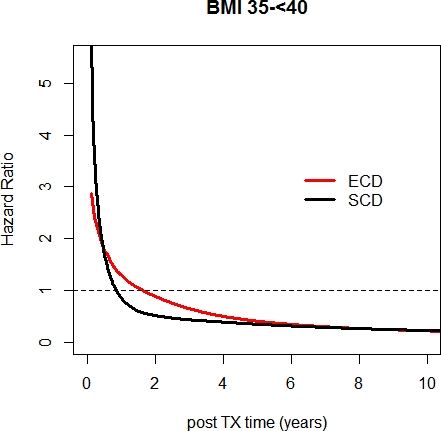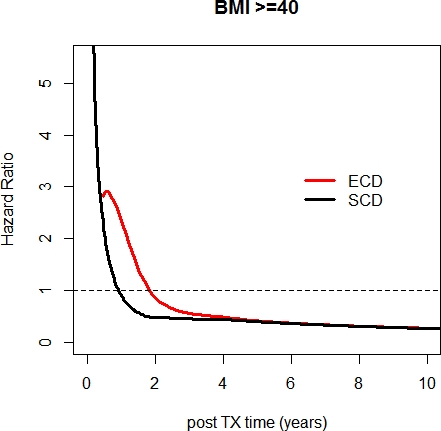Patients With Severe and Morbid Obesity Benefit from Deceased Donor Kidney Transplant
1Medicine, University of Virginia, Charlottesville, VA
2Biostatistics, University of Virginia, Charlottesville, VA.
Meeting: 2015 American Transplant Congress
Abstract number: 450
Keywords: Kidney transplantation, Obesity
Session Information
Session Name: Concurrent Session: Kidney Complications: Other
Session Type: Concurrent Session
Date: Tuesday, May 5, 2015
Session Time: 4:00pm-5:30pm
 Presentation Time: 4:36pm-4:48pm
Presentation Time: 4:36pm-4:48pm
Location: Room 118-AB
More than one in three Americans are obese yet obesity is considered a relative and sometimes absolute contraindication to kidney transplant. Previous studies suggest that obese recipients have inferior allograft and patient survival. Hence, many centers decline candidates based on body mass index (BMI) alone. We sought to better characterize the outcomes of patients with severe (BMI 35-39.9 kg/m2) and morbid (BMI > 40) obesity after deceased donor transplant by donor type.
Using SRTR data for all waitlisted kidney transplant candidates between 2000 and 2012 (n= 226 588), we evaluated the association of different BMI categories and recipient survival compared to waitlisted patients matched by BMI group. We used time dependent Cox regression modelling adjusted for age, gender, race/ethnicity, diabetes status, and etiology of kidney disease.
About 37.6% of waitlisted patients were obese and 14.4% had a BMI > 35. Compared to those candidates remaining on the waitlist, there was a clear reduction in risk of death at three years after transplant across all BMI subgroups, independent of donor type (figures 1 and 2). For recipients receiving standard criteria donor (SCD) organs, severely obese (HR=0.45, 95% CI 0.41-0.50) and morbidly obese (0.48, 0.40-0.58) recipients had a reduced risk of death compared to those remaining on the wait list. Similar to the decreased risk of death for normal BMI (20-24.9) recipients of expanded criteria donor (ECD) organs (0.52, 0.47-0.57), severely (0.53, 0.45-0.63) and morbidly (0.55, 0.40-0.76) obese recipients of ECD organs also saw a decreased risk of death compared to those remaining on the wait list.
Our findings suggest that severely and morbidly obese patients do benefit from kidney transplantation and should be considered as potential recipients. 

To cite this abstract in AMA style:
Lucar ANishio, Ma J, Vranic G, Keith D. Patients With Severe and Morbid Obesity Benefit from Deceased Donor Kidney Transplant [abstract]. Am J Transplant. 2015; 15 (suppl 3). https://atcmeetingabstracts.com/abstract/patients-with-severe-and-morbid-obesity-benefit-from-deceased-donor-kidney-transplant/. Accessed February 27, 2026.« Back to 2015 American Transplant Congress
